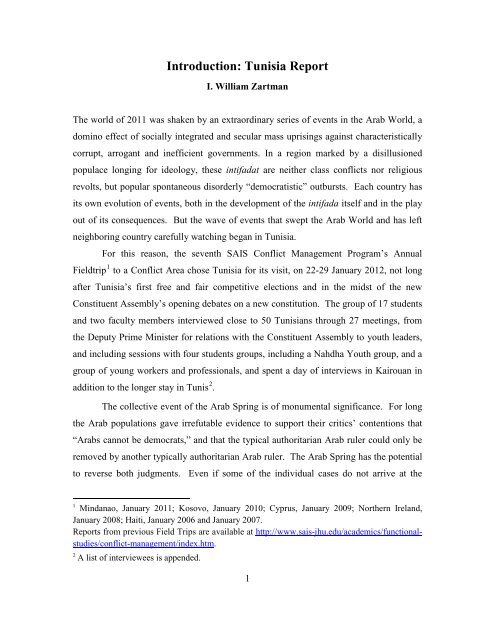Tunisia: Understanding Conflict 2012 - Johns Hopkins School of ...
Tunisia: Understanding Conflict 2012 - Johns Hopkins School of ...
Tunisia: Understanding Conflict 2012 - Johns Hopkins School of ...
You also want an ePaper? Increase the reach of your titles
YUMPU automatically turns print PDFs into web optimized ePapers that Google loves.
Introduction: <strong>Tunisia</strong> Report<br />
I. William Zartman<br />
The world <strong>of</strong> 2011 was shaken by an extraordinary series <strong>of</strong> events in the Arab World, a<br />
domino effect <strong>of</strong> socially integrated and secular mass uprisings against characteristically<br />
corrupt, arrogant and inefficient governments. In a region marked by a disillusioned<br />
populace longing for ideology, these intifadat are neither class conflicts nor religious<br />
revolts, but popular spontaneous disorderly “democratistic” outbursts. Each country has<br />
its own evolution <strong>of</strong> events, both in the development <strong>of</strong> the intifada itself and in the play<br />
out <strong>of</strong> its consequences. But the wave <strong>of</strong> events that swept the Arab World and has left<br />
neighboring country carefully watching began in <strong>Tunisia</strong>.<br />
For this reason, the seventh SAIS <strong>Conflict</strong> Management Program’s Annual<br />
Fieldtrip 1 to a <strong>Conflict</strong> Area chose <strong>Tunisia</strong> for its visit, on 22-29 January <strong>2012</strong>, not long<br />
after <strong>Tunisia</strong>’s first free and fair competitive elections and in the midst <strong>of</strong> the new<br />
Constituent Assembly’s opening debates on a new constitution. The group <strong>of</strong> 17 students<br />
and two faculty members interviewed close to 50 <strong>Tunisia</strong>ns through 27 meetings, from<br />
the Deputy Prime Minister for relations with the Constituent Assembly to youth leaders,<br />
and including sessions with four students groups, including a Nahdha Youth group, and a<br />
group <strong>of</strong> young workers and pr<strong>of</strong>essionals, and spent a day <strong>of</strong> interviews in Kairouan in<br />
addition to the longer stay in Tunis 2 .<br />
The collective event <strong>of</strong> the Arab Spring is <strong>of</strong> monumental significance. For long<br />
the Arab populations gave irrefutable evidence to support their critics’ contentions that<br />
“Arabs cannot be democrats,” and that the typical authoritarian Arab ruler could only be<br />
removed by another typically authoritarian Arab ruler. The Arab Spring has the potential<br />
to reverse both judgments. Even if some <strong>of</strong> the individual cases do not arrive at the<br />
1 Mindanao, January 2011; Kosovo, January 2010; Cyprus, January 2009; Northern Ireland,<br />
January 2008; Haiti, January 2006 and January 2007.<br />
Reports from previous Field Trips are available at http://www.sais-jhu.edu/academics/functionalstudies/conflict-management/index.htm.<br />
2 A list <strong>of</strong> interviewees is appended.<br />
1
















